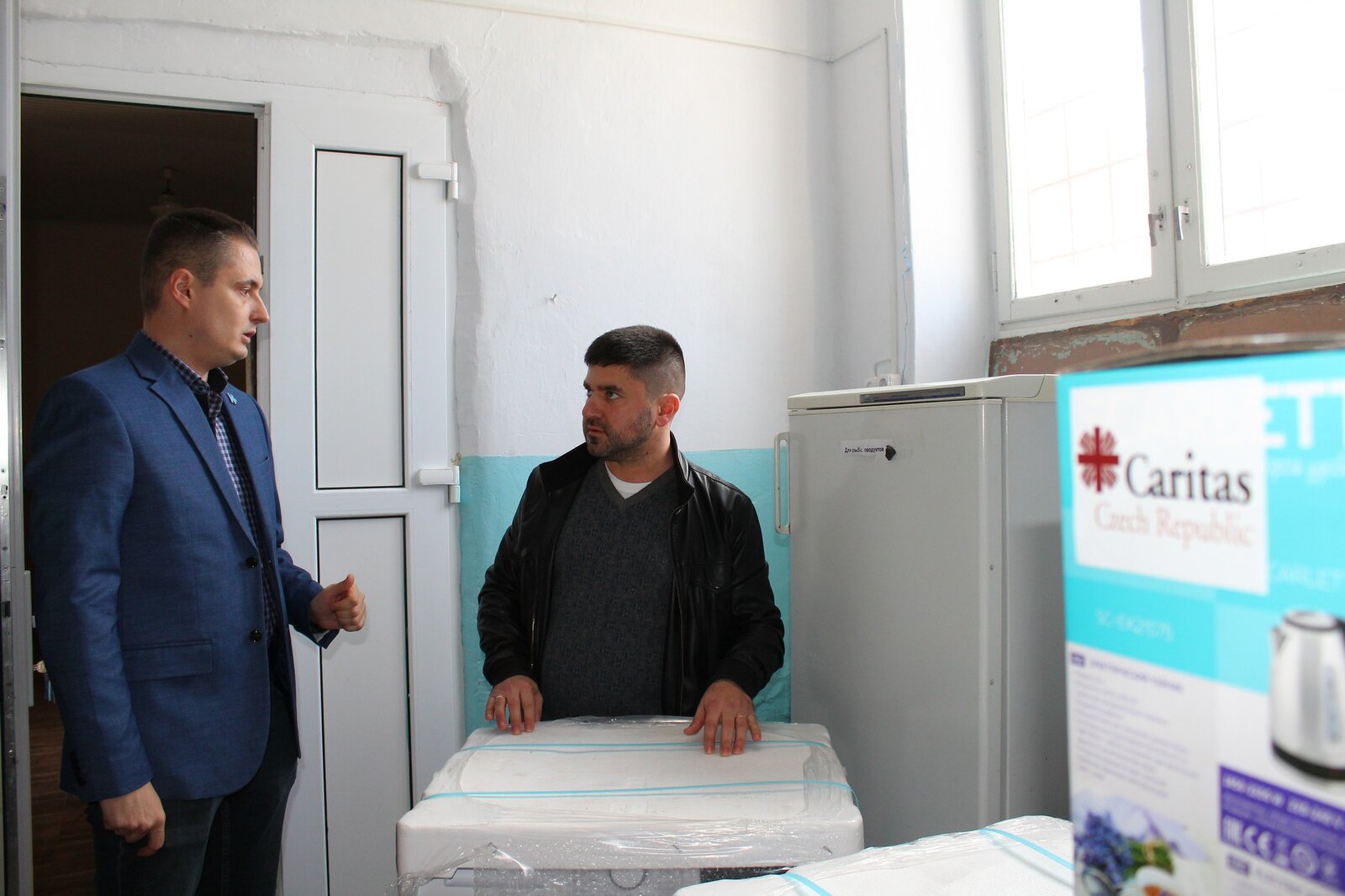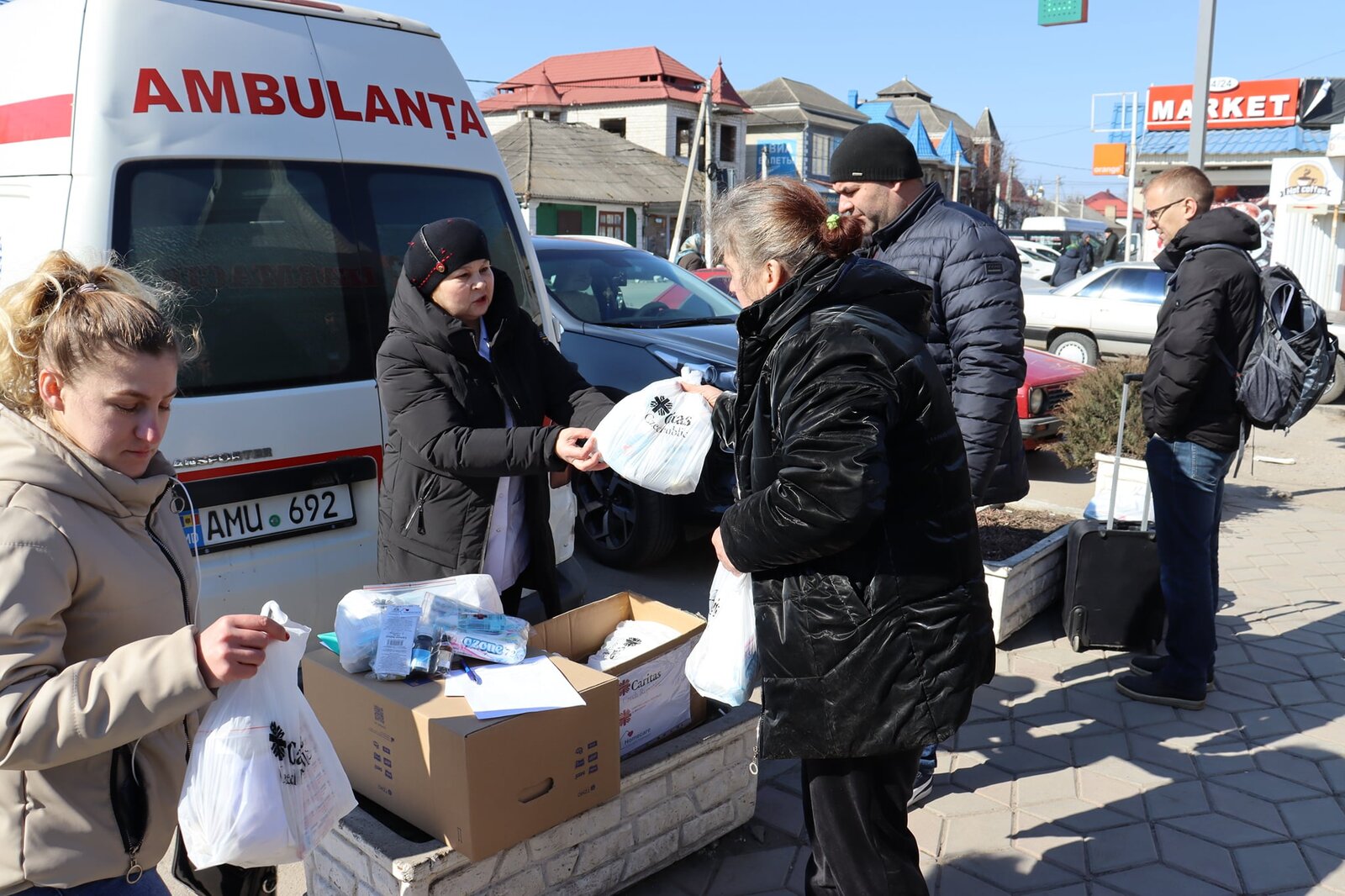Uncertainty and despair - with these feelings tens of thousands of refugees from Ukraine are coming to Moldova today. These people, who overnight lost everything they had built a life on, now have to start their lives again. How is Moldova helping the refugees on its territory today and how is Caritas Czech Republic’s aim supporting this process? Vasile Vasiliev, Country Director, answers these questions.
What was the first reaction and actions of Caritas Czech Republic in Moldova to the wave of refugees from Ukraine?
February 24, 2022 will forever remain one of the darkest days in the history of mankind. It was a shock and a cold shower at the same time, as I, like many others, did not believe that a war between Russia and Ukraine was possible. Millions of people had only a few hours to leave their homes and everything they had saved during their lives to flee the war. Moldova, being on the border with Ukraine, was able to to react quickly on several fronts, including welcoming and accommodating hundreds of thousands of people.
In emergency situations, we need to react quickly, which is why we immediately went to the border to assess the situation. In Palanca, the wave of refugees was growing by the hour. They were mainly women with small children, the elderly and people with disabilities. They all had hope in their eyes - they will be safe here in Moldova!
At the same time, we turned to the authorities to see how we can support the state's efforts to help Ukrainian refugees who decide to come to Moldova. The response was prompt. At this stage, it was necessary to equip the refugee centres in the country with basic things, very necessary things that were completely lacking at that time. People fleeing the war were unable to take anything with them. They only had their identity papers and two or three coats. And when they arrived in the placement centres in Moldova, they often did not even have anything to sleep on or to wrap themselves up in during the night.
How has Caritas Czech Republic helped the refugee centres in practice?
We visited several shelters in the districts close to Ukraine. One of them was in the village of Popeasca, which is only a few kilometres from the Moldovan-Ukrainian border crossing. Here, the local authorities opened a refugee placement centre in an orphanage that was no longer functional but was still in good condition. What this building needed were beds, blankets and pillows. It also needed washing machines, a fridge, water heaters for tea and other small appliances that the refugees could use.
These might seem like small things to those who use them every day, but when you are deprived of all the basic comforts, you understand their true price. Caritas Czech Republic has purchased all the necessities for 8 centres in the country, most of them in close proximity to the Ukrainian border.
What was the reaction of the people who found shelter in Moldova?
When we brought the equipment to the centres, people there said they never expected that they would find accommodation immediately after crossing the border. Even in a placement centre. They did not believe that they would be able to take a shower, drink hot tea or wash their clothes. Today Moldova has to take care of all these people who need food, roof over their heads, medical care, etc.
Together with the Homecare Association, we have managed to provide refugees with medical kits. We have distributed about 3.000 of them and we want to continue with this. Why? Because so many people who have fled thewar suffer from chronic illnesses. I'm talking about diabetes, hypertension, kidney disease - people who need hemodialysis, etc. And many of them are from vulnerable groups of society and cannot afford the bare minimum, all the more medication.
How many Ukrainian refugees are in the Republic of Moldova today and how can Caritas Czech Republic help further?
Today there are about 80 thousand refugees from Ukraine in Moldova. In total, almost half a million Ukrainians have entered the country since the beginning of the war. I would stress that most of them are mothers with young children, elderly people, people with disabilities.
So today Caritas Czech Republic is concentrating its efforts on providing these people with psychosocial services and the minimum necessary financial support. Thus, in addition to distributing medical and hygiene kits, we cooperate with local medical and social service providers in providing psychosocial support to refugees who need it and minimum financial assistance in 5 districts of the country - Dubasari, Straseni, Comrat, Ceadir-Lunga and Vulcanesti.
The interventions are financed through the fundraising launched by our organization in the Czech Republic from the very first day of the war and the European Commission's ECHO - Civil Protection and Humanitarian Aid - General Department.
Can you tell us more about the ECHO-funded project? What will you be doing?
The aim of the project is to ensure access to quality health care and safe and dignified shelter for vulnerable refugees in Ukraine, as well as meeting the basic needs of refugees sheltered in Moldova. Our activities focus mainly on providing assistance to refugees in existing refugee reception centres and host communities in the country.
We aim to ensure access to immediate and medium-term health services for Ukrainian refugees by providing medical supplies to refugee reception centres and covering the costs of specialized psychological counselling for vulnerable people. We also want to financially support approximately 2000 refugees from the above mentioned 5 districts with a monetary support of 2,200 lei/month.
This intervention is part of the efforts of the whole international community to support refugees from Ukraine all over Europe and to ensure part of the minimum conditions for a decent life in Moldova.
Caritas Czech Republic has other ongoing projects, how do they fit into the current work of the country office?
As a developing country, we mainly focus on development cooperation projects in Moldova. Caritas Czech Republic has been doing the same for more than 17 years. Currently we are active in several areas such as social and medical care, telemedicine or waste management. Thus, in addition to the 2 humanitarian aid projects for refugees in Ukraine, we are working on 4 other projects bringing modern technologies closer to the beneficiaries of medical and social services, developing and improving the home care sector in the country, creating medical-social centres in the districts of Vulcaneesti, Ocnita and Grigoriopol and building a functional waste management system in Criuleni.
Our projects have holistic approaches and include a multitude of issues such as updating legislation, continuous training of professionals, development of services throughout the country and much more. We support both central and local authorities in the process of economic and social development, so that ultimately all actors involved can more easily face the current challenges.
From what you are telling us Caritas Czech Republic in Moldova has many commitments to face.
Indeed, it has. We have an experienced, professional and proactive local team, as well as substantial support from our colleagues in Prague. We are confident that we will surpass all challenges and know that we can do even more than we help right now.
For many years, thanks to the financial support of many international partners, we have been contributing to the development of important areas in Moldova and we will continue to do so for as long as necessary. And our motto "We help where people need us" is more relevant now than ever, because we offer Ukrainians all the support we need, regardless of the country in which they have taken refuge.
Did you find the interview with Vasile interesting? Read more:
- People study logistics for years, we had a day and a half to send our first humanitarian truck, says Šárka Prošková
- Iryna left Kiev with her family. But they are staying in the country and want to help
- Ukrainian refugee: No one wanted to believe that this pointless war would come. Then we heard the bombs









